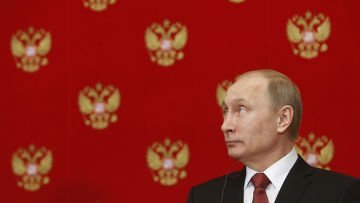
Back in the late 1980s and early 1990s, the concept of empire entered Soviet and post-Soviet studies, as scholars attempted to place the end of the Soviet multinational state in an appropriate comparative framework. A variety of excellent books was the result, including edited volumes by Bruce Parrott and Karen Dawisha, Barnett Rubin and Jack Snyder, Richard Rudolph and David Good, and Karen Barkey and Mark von Hagen. No less important, the concept of empire entered the post-Sovietological discourse and, as such, lost its former association with Cold War political platforms. Empire, in a word, became respectable, so much so that the term is now used far more loosely with reference to the USSR and Russia than most rigorous scholars of empire would prefer.
Oddly enough, while many of Vladimir Putin’s policies toward the Russian “near abroad” have often been termed imperial or neo-imperial, very little effort has been made to connect Putin’s current imperial aspirations to the obvious fact that the Soviet empire collapsed and that imperial collapse presumably had some impact on Russia’s subsequent trajectory. Although Mikhail Gorbachev’s perestroika weakened the sinews of the empire, the USSR remained intact until 1991, when, within the space of several months, the entire imperial system disappeared and was replaced by independent — or nominally independent — states.
Movements, parties and individuals committed to imperial revival have existed in all post-imperial metropoles. And of course, they have also existed in post-Soviet Russia, with the most obvious example beingVladimir Zhirinovsky and his bizarrely named Liberal Democratic Party, who have been explicitly promoting imperial revival since the early 1990s. But the urge for reimperialization is especially strong in metropoles that survive imperial collapse — or the sudden, rapid and comprehensive dismantling of the core-periphery ties that defined the empire. Metropoles that emerge from decaying empires, those that lose territory over centuries or decades, generally reconcile themselves to the loss of empire and rarely embark on full-scale attempts at imperial revival. In contrast, post-collapse metropoles still retain imperial ideologies, discourses and cultures, while the economic, institutional and social ties that once bound peripheries to cores generally continue to exist, even after the formal core-periphery relationship has been dismantled. Under conditions such as these, there are strong grounds for imperial revival to acquire policy prominence among post-collapse core elites.
There are three good examples of post-collapse cores pursuing imperial revival after their empires collapsed. The Russian Bolsheviks drew on imperial ideologies and took advantage of continuing structural ties and succeeded in reestablishing most of the former Russian empire in 1918-1922. The German Nazis drew on similar ideologies and structural connections, but they failed to reestablish the German Reich in the 1940s. And post-Soviet Russian elites, both in the 1990s, when the imperial discourse first enjoyed a revival among Russian policymakers and intellectuals, and in the period since Putin came to and consolidated power, have progressively encroached on the sovereignty of their non-Russian neighbors. Russian elites have pursued reimperialization in the form of economic schemes intended to bind non-Russian economies to Russia’s, the use of “soft power” propaganda of the indivisibility of the so-called “Russian world” and the cultivation of Russians and Russian speakers in the “near abroad,” and by means of hard power, as in Georgia in 2008 and Ukraine in 2014-2015.
It is with imperial collapse and revival in the analytical background that comparisons of Weimar Germany and “Weimar Russia” become apposite. Both experienced collapse. Both experienced terrible economic hardships in their aftermath. Both blamed the collapse and the economic hardships on democrats. Both sought succor in the imperial traditions and cultures of their nations. Both experienced the coming to power of right-wing nationalists and strong men who promised to reestablish the glory of the nation and its imperial grandeur. And both embarked on soft- and hard-power attacks on their neighbors.
Two observations flow from this analysis. First, it attributes the ongoing Russo-Ukrainian War almost exclusively to Russia’s internal post-imperial dynamics — culture, ideology, discourse, economic and institutional structures—and not to external factors, such as real or perceived threats from the post-collapse core state’s neighbors. Seen in this light, although the Treaty of Versailles may have been punitive, it was not responsible for the Nazis or Hitler’s aggression. Similarly, NATO and the West may have annoyed the Russians, but Putin’s turn to the right and his wars against Georgia and Ukraine are the products of Russian imperial collapse, the nature of his strongman regime and systemically generated attempts at imperial revival.
Second, the outcome of Putin’s attempts at imperial revival is still unclear. Will he succeed like the Bolsheviks, or will he fail, even if at great cost to everybody, like the Nazis? The factor that may decide the outcome today, just as it did in Russia in 1918-1922 and Europe in 1939-1945, is the degree to which other powers get involved in the conflict between post-collapse metropoles and peripheries. In the Russian case, they stayed out, and the Bolsheviks were able to regain much of the empire. In the Nazi case, the great powers got involved and the result was the collapse of the Nazi imperial project. What is striking about today’s Russo-Ukrainian War is the extent to which the great powers — the United States, Germany, France and the United Kingdom — have sided with Ukraine. That suggests that Putin’s imperial project will fail, though just when that will happen and how many lives will be lost in the process remains unclear.
Source: http://www.washingtonpost.com

 April 1, 2015
April 1, 2015  Опубликовано в
Опубликовано в